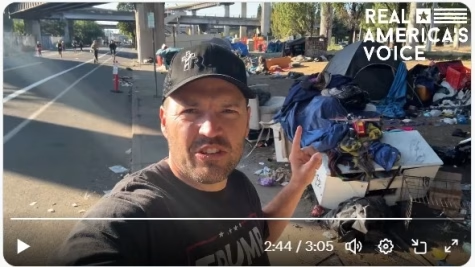On Sunday morning, runners laced up and poured onto the streets of Portland for the annual Portland Marathon — a ritual of fitness, community and civic pride that paints the city in bright colors and finish-line triumph. (Portland Marathon)
But only a block away, Real America’s Voice correspondent Ben Bergquam recorded a different Portland: a landscape of tent encampments, discarded belongings, people shooting up in public, and a strain of desperation that undercut the pageantry of the race. Bergquam captured both scenes on camera and posted the footage to social media, asking a blunt question: which Portland is the real one?
The video is framed around that contrast. In one lane, joggers stride past mile markers; in the other, Bergquam walks through a disheveled neighborhood where trash collects, mattresses sit on sidewalks, and residents , some with pets, shelter under tarps. He stops and talks to several unhoused people about their situation, and their answers feed into the larger argument Bergquam makes on camera: the city’s professed compassion and the presence of well-funded nonprofit groups have not translated into practical help for those living on the streets. “All the homeless advocacy groups that are making millions and millions of dollars,” he says in the clip, “I don’t see them doing anything to actually fix the problem.”
What makes Bergquam’s footage striking is not only the images but the juxtaposition , the marathon’s upbeat rhythm set against visible suffering. He narrates that juxtaposition as a diacotomy: a healthy city hosting a marathon and a diseased area just a block away. That contrast is visceral on screen: volunteers and spectators cheering for runners while, behind them, tents and discarded household items crowd the curbs. Running the race, Bergquam says, makes it easy to pretend everything is fine, “But right down here… all homeless, all homeless down here… Everywhere you go around, Portland is homeless.”
Bergquam’s reporting pushes a clear political line: that left-leaning policies and under-policing have turned Portland from a “world-class city” into a “hellhole.” He blames NGOs and municipal leadership for virtue-signaling rather than solving the crisis.
“They can pretend it’s good,” he tells viewers, “but when you run in the Portland marathon, and this is what you see all over the city… This is what leftist policies get you.” Those are his words, and the video positions his interviews with unhoused Portlanders as corroboration.
The people he interviews add human detail to the images. In one short exchange, a man wrapped in a sleeping bag speaks about losing pets, and Bergquam gestures to a dog shivering nearby. Another interviewee notes the daily deaths tied to fentanyl and expresses frustration that “nobody does anything.”
Those direct, on-the-ground voices puncture any neat political summary: whether the cause is policy, funding priorities, systemic neglect, or something else, the people on-screen are clearly suffering,and they want action. Bergquam closes the segment with an appeal that mixes faith and force: “You need Jesus back important, but you also need National Guard,” he says, tying moral renewal to increased security presence.
If the footage is persuasive, it’s mainly because of the photographic evidence of disparity. A marathon route and a neighborhood of encampments can, and do, coexist and that coexistence raises uncomfortable questions about how cities allocate resources and which stories get center stage. Runners and spectators enjoy a carefully produced event with traffic detours, medical tents and volunteers; across the street, tents and trash speak to people left out of that production.
Bergquam’s choice to record both scenes in the same frame forces viewers to reconcile pride with neglect.
Visible homelessness and drug use remain urgent, painful realities in many American cities and Portland’s marathon-day contrast makes those realities hard to ignore.
In the end, Bergquam shows that as the marathon runs; people run out of options. That tension — public festivity beside private collapse — is the story Portland’s streets told on Sunday, and Bergquam’s camera simply refused to look away.
See more of our coverage of Portland’s demise:
